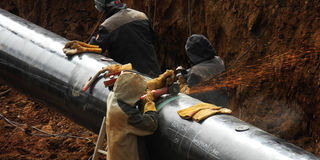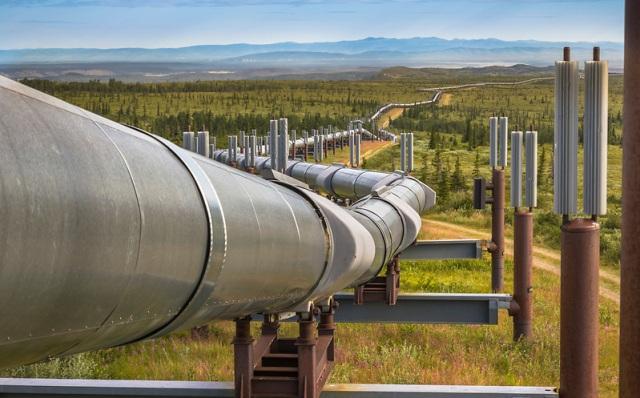Prime
Why is compensation of oil pipeline affected persons taking long?

What you need to know:
- For almost four years now, some valued land has not been compensated yet some people claim they can no longer use such land. Why is it taking so long? Well, government has indicated this is one of the areas being expedited. But wont the delay affect implementation of pipeline activities?
Oil companies Total Energies and CNOOC will now give a final nod to tier 1 contractors to undertake upstream operations as the country counts down to first oil in 2025.
Now that things are moving fast, it would be ideal that all loose ends are fastened.
Following the announcement of Final Investment Decision (FID) for three major oil projects in the Albertine region recently, government and joint venture partners are ramping up efforts to acquire pipeline land.
This particular area has been a deadlock for about four years with some of the people whose land was valued, still waiting to be compensated. Others claim their properties were undervalued. Thus there is a likelihood of delaying the project.
The East Africa Crude Oil Pipeline (EACOP) is a 1,443km project that will stretch from Kabaale in Hoima to Chongoleani, Tanga in Tanzania.
It is estimated that the pipeline, which is being developed by joint venture partners - CNOOC and Total Energies and the governments of Uganda and Tanzania - will transport up to 216,000 barrels of oil per day.
However, the land acquisition process has been slow and challenging at the same time.
The process started in 2018 but continues to face setbacks, among which include campaigns by human rights activists, who claim project affected communities are not being listened to.
The project’s Resettlement Action Plan had anticipated that in Uganda, the first cut off dates for earmarked land for the pipeline right of way would be June 2018, while in Tanzania it had been put at between May and October 2018.
But this was never realised because some human rights activists such as Brian Nahamya of Global Rights Alert, believe project affected persons have been disregarded.
“It’s unfortunate that government [finalised] legal frameworks for EACOP Special Provisions 2021. Its total violation of human and community resource rights. Project affected persons were not consulted on the EACOP Bill. Sealing FID without compensation of EACOP project affected persons indicates [that] government and oil companies are so concerned [about] business than social wellbeing of affected persons,” he says.
Some project affected persons in Hoima, Kikuube, Kyotera and Sembabule have been raising issues such as undervaluing of their properties and delayed compensation, while others, especially in Kakumiro District are concerned of unresolved conflict over land rights between tenants and landlord in regard to Mailo land.
Charles Bandahura, a project affected person in Karokarungyi village, Katikara sub-county in Kakumiro District, is one of the dissatisfied people.
He says, the amount of money that he was offered cannot find another piece of land for him to relocate his family.
Therefore, Priscilla Tusiime, the Kitara Civil Society Organisation Network, says it is such issues that are going to cause more confusion, noting that: “By the time [joint venture partners and government] signed the Final Investment Decision, issues such as compensation should have already been handled.
“Starting work when some issues are still standing may have a negative impact on the project,” she says and notes that some of the people whose land was valued have not used it since 2018 yet they have not been compensated to relocate to other areas.
In December Energy Minister Ruth Nankabirwa, admitted there had been delays in compensating project affected persons but noted government was doing whatever it takes to see that compensation is expedited.
“The valuation process has been done by the chief government valuer. The next step will be seeing money coming to their accounts. We need to speed up and we need to up our game as far as sensitisation of project affected persons is concerned,” she said.
In an interview, Gloria Sebikari, the Petroleum Authority of Uganda manager corporate affairs and public relations, told Daily Monitor that compensation is being expedited, noting that no activity will be conducted on land that has not be compensated.
“Compensation and livelihood support continues. And for clarification, there is no activity that will be carried out on uncompensated land,” she says.
In his annual media briefing recently, Ernest Rubondo, the Petroleum Authority of Uganda executive director, said land acquisition for EACOP was by end of 2021 standing at 85 percent, noting that signing of compensation agreements had commenced on December 13, 2021, to enable payments resume last month.
“With this momentum, 2022 is going to see a beehive of activity for the oil and gas sector. The contracting and land acquisition processes will be concluded, and the work on ground will intensify, with the commencement of development drilling of the planned 450 wells in the second half of 2022,” he said.
Project affected persons
The EACOP project will affect 3,792 people from 2,500 households in Uganda only. The pipeline, which will be 24‐inch diameter heated and buried, will have six pumping stations (two in Uganda), 27 heating stations and two pressure reduction stations.
It will have a storage terminal with four tanks each with two million barrels capacity at Tanga and a load out facility for a SuezMax tanker to be constructed at Tanga.
In Uganda, the pipeline will cover a distance of 296 km, through 10 districts including Hoima, Kakumiro, Kyankwanzi, Mubende, Gomba, Sembabule, Lwengo, Kyotera, Rakai, Kikuube.
In Tanzania, it will cover a distance of 1,147 km, through the eight regions of Kagera, Geita, Shinyanga, Tabora, Singida, Dodoma, Manyara, Tanga and 24 districts.
According to the EACOP website, the pipeline is heated because Uganda’s crude oil is naturally sticky and waxy at room temperature implying that it solidifies when exposed to low temperatures.




